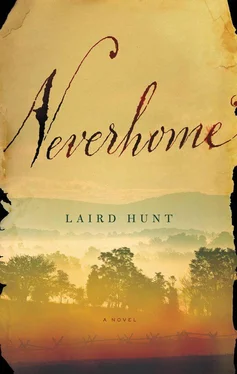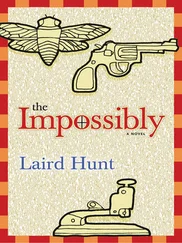
There must have been some spell to that tobacco I carried up to my room for I spent days entire afterward, didn’t matter how hot it was, back down under the covers in the dim, my eye, tearless as it was, sometimes eating at the dust whirling the light planks come in through cracks in the curtains, sometimes the dark of the pillows, sometimes just the back of its own lid. Other days I rose and worked in the garden or saw to the yard or cleaned windows or washed floors from dusk until dawn, smelling the fresh airs of the world all the length of the day, only to crawl at its end back into that room and under those covers where I stopped remembering battles and madhouses and husbands and stories and the soft breath of small babies and mothers who broke their own commands. I did my eating at night, standing in the cool of the pantry. Sometimes the General’s wife would come down in her nightgown and stand alongside me and eat her meal that way too. We almost never talked as we ate. Just let our fingers go out and open jars and cut slices and spread spreads. It was one of these nights, as we were eating hoecakes and honey, that she put her hand on my hand and asked me if I was awake or asleep.
“I don’t know,” I said, so she told me to follow her and we went out to the pump where she had me fill a bowl and give it to her. Then she lifted up that bowl and poured it over my head.
For a minute I was far away. I was back in the heat of Virginia. I was standing at the General’s side. He was asking me to be a sharpshooter; I was hiding in a well; whole days went by as I waited to take my shot, and then I was in a tree, swaying with its branches, leaning with its leaves, aiming my gun. “I know you didn’t steal out of any of your own comrades’ haversacks, I know it, you are my sharpshooter, you are my best soldier,” the General said. The bowl came back up off my head before I could answer.
The General’s wife told me then as I dripped out there in the yard in Ohio and not on the fighting fields of Virginia that I could stay at her house for as long as I wanted but that it was time to wake now, that I had slept long enough, that there would be sufficient time in the hereafter for the variety of sleeping I had been doing those past weeks.
“Your husband, my General, left me behind to rot in that madhouse,” I said.
“Are you sure that’s the way it happened? Are you sure that is what he did?” she said.
I was silent a long time.
“I’m not sure,” I said.
It was the next day I put an end to my thinking and got myself roused up to go. After she had filled my sack with jars and sandwiches, the General’s wife walked me to the edge of town. We had a plan to stop by Weatherby’s on my way out, for he had built his greenhouse. She said as we walked it was a wide world had new greenhouses go up on one of its ends and black powder to blow a man apart on its other. I said she wasn’t wrong. That the world was wide. I had seen some of it. Weatherby had too. We all had. Chasms never greater and miles just as long. She whistled as we walked. It was a handsome tune, happy and mournful both, and I realized I had been hearing it every day the past weeks without listening to it.
“What is that you are whistling?” I asked her.
She looked at me long and a little strange, then laughed. It was just something she had heard from the General when he had last been home on leave, a song his men and lieutenants and captains liked to sing or whistle when they played cards or washed dishes or dressed wounds or cleaned rifles or wrote letters or chopped wood or raised tents or lay in their sickbeds or stood firm by their cannon or mounted their horses or ran into battle for a war wouldn’t ever end or wandered the fresh fields of the dead.
“The General sang this song?” I asked.
“Oh, he loved to sing it,” she answered.
“Say its name,” I whispered.
She put her hand on my arm and leaned close to my ear and whispered back.

When we arrived, Weatherby gave us a ceremonial bow and asked after the General. We talked on the General some but it got to sound almost like we were making speeches, one after the other, and we left off. The General’s wife had brought Weatherby a few jars of pickled carrots, one of which she opened for him.
“Nothing in the world quite like a pickled comestible to my way of looking at it,” Weatherby said.
“They are choice morsels,” I said.
“You can say it and then you can say it again and not use it up,” he said.
“Show us what you have built,” the General’s wife said.
I was ready for the road but found my curiosity for this new thing too strong. Weatherby led us past a wide square of peach trees were now loaded and not above a week away from producing and past the silvery curve of a little stream.
“You got sold smudged glass,” I said when we came to it. It was a pretty thing, planted off by itself in the middle of a fresh-scythed lawn, with the glass neat set, but all the panes I could see from where we stood held marks.
“I got sold what I paid for.” Weatherby smiled strangely. “Just exactly what I paid for.”
“That’s picture glass,” the General’s wife said. “A greenhouse made out of picture ghosts.”
We went inside. Stood among the empty benches. As we watched, the sun tore off its cloud and lit up a hundred likeness images. It was the happy faces of fifty men gone off to war and fifty women didn’t. Or maybe they didn’t. Maybe there were some standing up there straight in their Sunday dresses were out right that minute on the field holding rifles, getting their arms sawed off, dying over their slops, singing it out with all the rest of them about watch fires and fateful lightning and the coming of the Lord. Away off somewhere in that other country knowing they would never get home. There was ghost pictures too of countryside and farm buildings, a town square, a trail, flowering bushes, a tree in the sunlight, a brook in the breeze. There was even three or four windows full of boys had got left behind in their bones at the Second Bull Run, which the photographer, Weatherby told us, had visited the weeks before he died.
Weatherby and the General’s wife stayed inside that greenhouse awhile longer but my face and neck had grown hot, so I stepped outside into the cool and thought I would walk a minute among the peach trees. They were old and intergrown so I had to work and crouch a little to pass between them and after a minute gave it up and sat down near the middle of the orchard against a trunk. There were sweat bees and butterflies at their work and one of them, with green and gold and turquoise to its wing, took my eye over to the back of Weatherby’s house, where, sitting on the bench in the sunlight, I saw his grandson. He was wearing pants and undershirt and had his hands in his lap. The hands were big and the fingers skeletal. His bare feet, planted firm in front of him, were flat and narrow and long. There was a clean bandage wrapped around his ears. Over his face he wore a purple veil. There was a little bit of a breeze playing with the under-end of it. Otherwise there wasn’t a thing on or around him outside flying insects that moved. He might have been graven. Image of hurt for the ages. Hurt come home. I stood after a minute and started to crouch my way out of the orchard to give him a good morning, but my feet found out other ideas and before I knew it I was off and away, without any farewells, let alone good mornings, on my road.
I thought as I put Yellow Springs behind me and walked fast away that it was seeing those dead soldiers and that whole world being lit to vanishing that made me want even harder than I had to get home before it was too late and Bartholomew and I and the wide world got turned to just some jelly dried to a cracked glass sheet. Cracked for the wind to whistle through. I thought too it might be the picture that bloomed up of Weatherby’s blind grandson tending sprouts in his purple veil under all those fading faces he couldn’t see, all those eyes fading off away until they were all as blind as he was that had put the snap in my step and made me move. Or maybe it was just the smell I still had in my nose of pickled carrots and the sound in my ears of them being crunched by Weatherby with his old teeth in that quiet place. Or the after-hum I had in my head of the General’s wife whistling “The Ballad of Gallant Ash.”
Читать дальше













